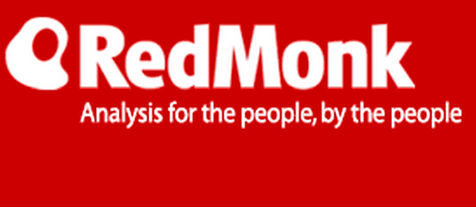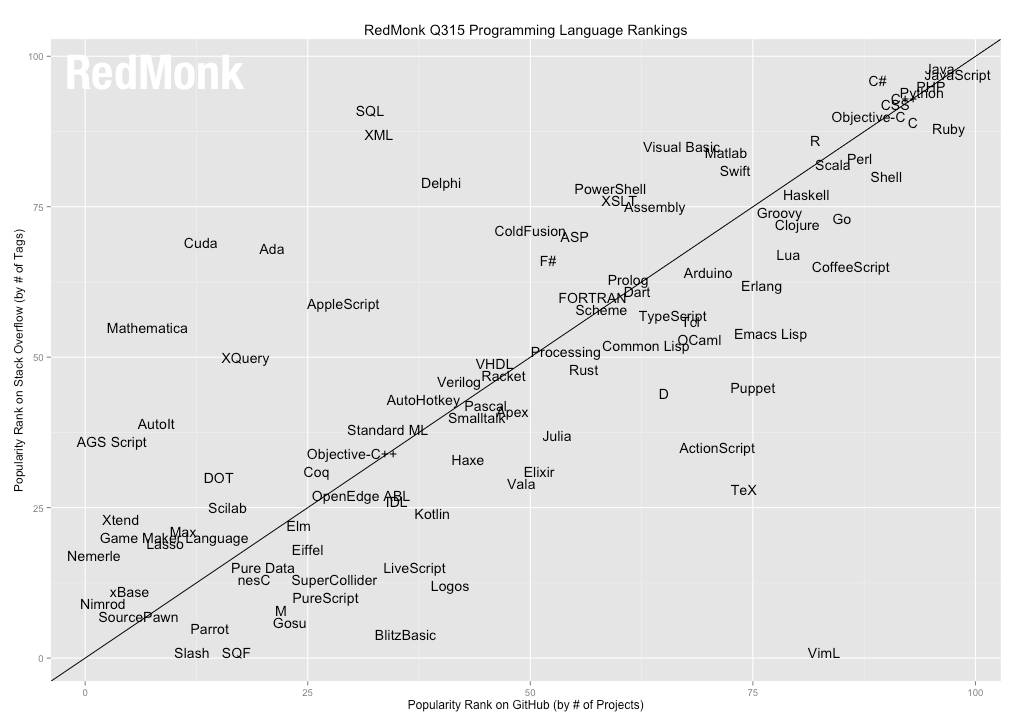| Top Languages 2015 - Stasis But For Go And Swift |
| Written by Harry Fairhead | |||
| Monday, 06 July 2015 | |||
|
There are other language statistics surveys and not just the Tiobe index. The Redmonk six monthly language rankings are well thought-out and well implemented and they reveal something interesting. What it reveals is that apart from a few mavericks the languages that are popular today have been for a while. This shouldn't be surprising as once a language has achieved a level of success it tends to stay that way because of the momentum it has built up. Do you really want to throw away all that learning, not to mention the code?
Put this way it is surprising that any language ever breaks into the existing pack of success. How hard can it be? Build a better language and the world will beat their way to your compiler. No not really. Designing a new language is a mugs game that is bound to lead to loneliness, disappointment, disparagement and eventual failure. This makes it all the more interesting when a language does make a breakthrough and embeds itself into the programmer's psyche. I can still remember when I heard about a new language called Java, it wasn't much to look at, but it was very important; I looked at it even if I didn't quite know why. In this first half year rankings the top 21 (not 20 due to ties) are: 1 JavaScript This sort of fits with the general outline of the language landscape that most polyglot programs would recognize. I'm not at all sure about putting CSS in there at all but I suppose even though it is a markup language it is Turing complete. The rankings are obtained by looking at activity on GitHub and StackOverflow. You can look at the exact methodology on the RedMonk site but yes it is flawed as all such indirect measures are likely to be but you might be slightly more reassured to learn that activity on GitHub and StackOverflow are highly correlated and usually lead to the same rankings. In fact it is interesting to look at languages that don't have a high correlation on the two - what have they done different?
Most notable outliers in this sense are Mathamatica, Cuda, Ada, Tex, VimL and SQL and you can see that they are not examples of main stream languages. Returning to the rankings the key observation is, as the RedMonk blog puts it: "... the Top 10 has been static. With minor exceptions, in fact, it has remained static for several years. While we see periodic arguments from advocates of a particular language, or a particular style or type of language, the simple fact is that the group of the most popular languages has changed little and shows little propensity for future change, though there are two notable would-be challengers..." The two challengers referred to are Go and Swift. The fact that Swift is moving up is no great surprise. Even if Apple programmers don't like their new language they really don't have a lot of choice but to adopt it, at least for new projects. ObjectiveC, no matter how much you might like it, is probably on its way out and it would be silly to put any more effort than absolutely necessary into it. Go is more of a mystery. Having programming it Go I like it but I can't say that there is a single compelling reason to use it in any new projects - perhaps I'm just not writing programmers that are "systemy" enough but I do use C a lot. The RedMonk blog also make the comment that perhaps as the future of Java on Android is in doubt due to legal problems with Oracle it could just be that Go is getting ready to step in. I some how doubt it.
More InformationThe RedMonk Programming Language Rankings: June 2015 Related ArticlesMost Popular Computer Languages 2015 Most Popular Languages For Challenges JavaScript Is The Language Of 2014
To be informed about new articles on I Programmer, install the I Programmer Toolbar, subscribe to the RSS feed, follow us on, Twitter, Facebook, Google+ or Linkedin, or sign up for our weekly newsletter.
Comments
or email your comment to: comments@i-programmer.info
|
|||
| Last Updated ( Thursday, 16 August 2018 ) |



